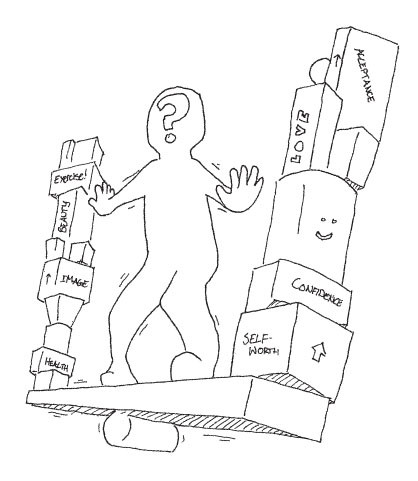Body Shaming is Discriminating

January 5, 2016
In today’s society, people of all genders are still pressured to conform to a single body type: thin. Constant advertising and media campaigns that promote unhealthy body ideals are symptoms of a society that undervalues people of larger body types. But in a world where a thin body is ideal, how can a balance between loving and taking care of your body be found?
The rising “body-acceptance” movement attempts to counter the stigma attached to obesity and to a smaller extent, a very low body weight, but it gets a couple things wrong. Firstly, loving your body should include having healthy eating habits. Unless an individual has a health issue preventing them from gaining or losing the amount of pounds necessary to maintain a healthy body weight, they should be promoting the pursuit of a healthier lifestyle.
According to Center for Disease Control and Prevention, we live in a country where in 2012, 69 percent of Americans were overweight. While advertisements may makes it seem like it is uncommon, our country has shown complacency to the obesity epidemic.
“While I am for loving your body, I do think people should be conscious of their lifestyle choices and try to maintain a healthy weight,” senior Clarissa Libertelli said.
Secondly, it is totally absurd to state that health can be achieved at every size. While having a large frame does not signal poor health, an anorexic or obese body does, as they signal two extremes. It’s not only ridiculous to perpetuate the idea that an obese or severely anorexic person can be healthy by living an active lifestyle, but dangerous. If we teach people to be satisfied with their bodies, both underweight and overweight, the pressure to be healthy is lowered and the risks for heart disease, high blood pressure and other cardiovascular complications rises.
Normalizing unhealthy body types does not motivate people to change their lifestyle habits and practice self-discipline. For a severely obese person, the lifestyle change may be dramatic and a certain type of “uncomfortableness” with oneself is necessary to inspire the change.
In no way does this mean that people shouldn’t be free to love themselves at any size or that “body-shaming” isn’t a very real problem. Unfortunately, simplifying the matter into terms like that ignores a crucial point: body-shaming is discrimination.
While the fat-acceptance movement can be detrimental, fat-shaming is an issue that requires so much more attention. Body-shaming isn’t just rude glances or stares — it is discrimination that can result in lost job opportunities, difficulty in social circles and isolation. While accepting obesity isn’t the answer, neither is shaming. We must shift from a culture of mindless isolation to a respectful and tolerant community.



